
 |
 |
28 Mar
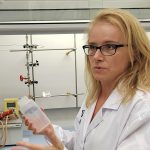
Technical Seminar on Materials Characterization by NANBIOSIS Unit 6 & NANE on April 1, 2025, at ICMAB-CSIC. Hands-on training & latest techniques. Register now! Barcelona, march 2025. The Soft Materials Lab – NANBIOSIS Unit 6, in collaboration with NANE, is pleased to invite researchers, professionals, and students to a Technical Seminar on Materials Characterization. The event will take place on Tuesday, April 1st, 2025, from 9:30 AM to 5:00 PM at the Institute of Materials Science of Barcelona (ICMAB-CSIC). This seminar will provide attendees with an opportunity to explore the latest advancements in particle size analysis techniques and gain hands-on[...]
25 Mar

A new TPU surface modification with an antimicrobial protein prevents biofilm formation in implants, offering an alternative to antibiotics and metal coatings. Barcelona, february 2025. Infections associated with medical implants are a serious health issue. A new study presents a chemical modification of thermoplastic polyurethane (TPU) with an antimicrobial protein that reduces the formation of biofilms of multidrug-resistant bacteria, offering an alternative to antibiotics and metal coatings in these devices. A team of researchers has developed a new strategy to chemically modify TPU, a material widely used in medical devices, to endow it with antibacterial properties and prevent infections associated[...]
28 Feb
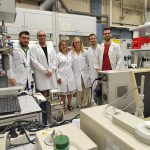
Join us on April 29 at ICMAB for “Fabry Connections” to explore research, patient insights, and future challenges in Fabry disease. Register now! Barcelona, february 2025. Today, February 28, World Rare Disease Day, NANBIOSIS reaffirms its commitment to advancing research and raising awareness of rare diseases such as Fabry disease. In this context, we are pleased to invite researchers, healthcare professionals, patient associations, and individuals affected by Fabry disease to the event “Fabry Connections: Science, Patients, and Future”, which will take place on Tuesday, April 29, 2025, at the ICMAB-CSIC. This event is organized by our Unit 6, Biomaterial Processing[...]
05 Feb
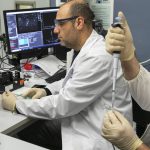
Misfolded ApoB100 in LDL promotes plaque buildup in familial hypercholesterolemia, raising cardiovascular risk. Structural preservation may aid prevention. Barcelona, febrero 2025. As recently published in the ICMAB webpage, a new study links ApoB100 protein structure (a key protein found in low-density lipoprotein, LDL, often called “bad cholesterol”) to increased cardiovascular risk in familial hypercholesterolemia. The study, led by IIBB-CSIC and CIBER, with the contribution of ICMAB’s SOFT Service (with NANBIOSIS Unit 6 at its core), shows that the protein structure directly contributes to an increased tendency to aggregate and form atherosclerotic plaques in patients with familial hypercholesterolemia. In these patients,[...]
29 Jan
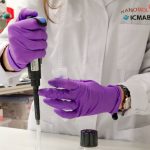
Fabry disease therapy nanoGLA, developed by NANBIOSIS and our partners, shows superior efficacy in preclinical trials, targeting systemic and brain symptoms. Barcelona, january 2025. An international research team led by the Institute of Materials Science of Barcelona (ICMAB-CSIC) and CIBER-BBN, in collaboration with the Institute of Advanced Chemistry of Catalonia (IQAC-CSIC), has developed a groundbreaking nanotechnology-based therapy called nanoGLA for the treatment of Fabry disease. The innovative solution has shown remarkable efficacy in preclinical studies and has been published in the open-access journal Science Advances (see below for reference links). What is Fabry disease? Fabry disease is a rare genetic[...]
23 Oct
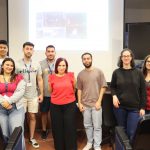
José Amable Bernabé, Technical Coordinator of Unit 6, hosted a course on “Characterization techniques for particulate materials”. Barcelona, october 2024. For yet another year, José Amable Bernabé, of the Soft Materials Service at ICMAB and Technical Coordinator of NANBIOSIS Unit 6, offered this course. The course was an explanation of different techniques to characterize nanoparticles and particulate matter, including the fundamentals of these techniques, sample preparation, practical examples and results interpretation. The course is offered every year through the CSIC training courses offered every year for all its staff, as reported in ICMAB webpage. Soft Materials Service The Soft Materials Service provides[...]
01 Mar
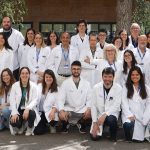
NANBIOSIS researchers pioneer novel treatments for Lysosomal Storage Diseases utilizing extracellular vesicles and liposomes, offering hope to patients. 1 March 2024, Vall d’Hebron Research Institute/ICMAB-CSIC (Barcelona) Lysosomal Storage Diseases (LSDs) encompass a group of rare disorders caused by mutations in lysosomal proteins. These mutations can lead to dysfunctional proteins responsible for breaking down cellular materials, resulting in the accumulation of deposits. Such accumulations can manifest in various neurological symptoms, ranging from progressive neurodegeneration to severe cognitive impairment. Often emerging in childhood, LSDs tragically culminate in premature death for many patients. Currently, up to 14 subtypes of LSDs can be treated[...]
21 Feb
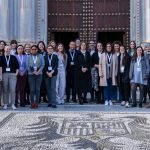
Nearly 40 scientists across 7 countries are pioneering this breakthrough in wound healing using a nobel and affordable bio-inspired, anti-bacterial matrix. In addition to the vast consortium, the project also comprises 5 small and medium-sized enterprises (SMEs) and 9 academic institutions. These were convened last February at the University of Granada to share insights, progress, and strategies. According to an article published by UGR at the beginning of this month, about 40 researchers involved in the project have attended a meeting to share results and progress. The Horizon Europe project NABIHEAL, coordinated by the Biomedical Research Networking Center (CIBER) at[...]